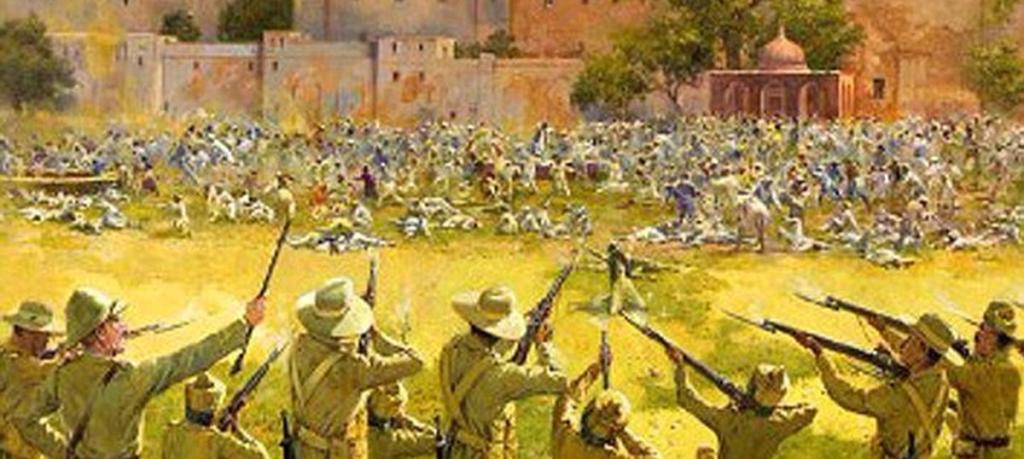As 13th April 2019 marked the 100 years of Jallianwala Bagh massacre, people all over the globe got reminded of the horrific incident that took the lives of over a 1000 peaceful Indians. Hundreds had gathered in Amritsar yesterday to mark the centenary of the incident in which British troops under the orders of Colonel Reginald Dyer had committed the horrific act. Amidst the mourning, several Indians had voiced the need for British government to issue a formal unconditional apology. However, historians have come out with the cruel reality of our own Rajas and leaders who had sided with the colonial rulers; and the citizens seek their apology before anyone else’s.
In the event of the centenary, UK Prime Minister Theresa May had mentioned the massacre during Prime Minister’s Questions on Wednesday, describing it as “a shameful scar on British-Indian history.” She added, “As Her Majesty the Queen said before visiting Jallianwala Bagh in 1997, ‘It is a distressing example of our past history with India. We deeply regret what happened and the suffering caused.'”
No matter how appreciative this stance by Thresea May is, it still isn’t an apology. Indian citizens have opined in favor of their growing desire for a need of formal apology from the British.
British Prime Minister Theresa May calling the #JallianwalaBaghMassacre a "shameful act" in British-Indian history is not good enough. There should be an apology in clear words.
— Harsimrat Kaur Badal (@HarsimratBadal_) April 13, 2019
Along with this, the greater need of the hour is for those Indians to accept the responsibility of the incident who were involved in it. The people of Amritsar particularly, and the Indian citizens in general, need those leaders to break their silence who were a party to the gruesome incident.
Sukhdev Singh Bhaur, former Shiromani Gurdwara Prabandhak Committee (SGPC) general secretary said, “Before we ask for an apology from the UK, we should not forget there were people within our country who justified Jallianwala and sided with the British.”
Col Dyer, known as “The Butcher of Amritsar”, said that the firing was a requisite measure, and that it was “not to disperse the meeting but to punish the Indians for disobedience”.
The top rajas, maharajas and regional leaders had refused to condemn the horrific incident and even sided with the Col Dyer during the time of the incident. Indian leaders had declared the peaceful gathering as a group of “rowdies” and praised British for killing them. They had continued to honour and appreciate Col Dyer as it was more important for them to maintain their position with the British to support their lavish lifestyles. One prominent name which crops up in the list is that of Maharaja of Patiala Bhupinder Singh, grandfather of Punjab Chief Minister Capt. Amarinder Singh.
In “The Magnificent Maharaja”, the biography of Maharaja of Patiala Bhupinder Singh, author K. Natwar Singh wrote, “Dyer had killed 379 unarmed men at Jallianwala Bagh in Amritsar on April 13, 1919. It is among the blackest episodes in the history of British Empire. It was cold-blooded murder by a callous, conceited, narrow-minded unimaginative man, who should have been court martialled and dismissed. Instead he was lionized and a fund was raised for him from England. Inspite of the Martial Law, disturbances took place in various parts of Punjab. Maharaja Bhupinder Singh gave full support to the Raj. Lt Governor O’Dwyer acknowledged this in his autobiography. Maharaja Bhupinder Singh was not alone. All other Punjab princes did the same. Servile loyalty of this kind did not do the princely order any good. Even Churchill condemned the Jallianwala Bagh killings. But not one Indian ruler. The order was committed to taking orders from their imperial Masters”.
In a situation where in the Britain’s own Secretary of State of war, Winston Churchill was rightly condemning the attack, openly in the house of the commons, Indian rulers were more concerned with “saving their seat”. Even the Prime Minister H.H. Asquith called it “one of the worst outrages in the whole of our history.” However, Punjab’s own leader, Bhupinder Singh in a telegram told Dyer, “Your action is correct and the Lieutenant Governor approves.”
Look who is talking. Your grandfather Maharaja Bhupinder Singh wrote a letter to English Parliament and declared that Dyer's action was approvable and "justified" https://t.co/ULWlEE9SUB
— True Indology (@TrueIndology) April 13, 2019
This sycophantic attitude of Bhupinder Singh towards the British, at the cost of his own citizens comes in light of the fact that he needed the unconditional British support to maintain his own exuberant lifestyle consisting of a luxurious fleet of cars and a harem full of women. Not to mention the abundance of jewels. He was also the first man in India to own an aircraft. For reasons arising out of his own selfish interests, he sacrificed the rights of the citizens. Amongst over 13 British honours and acclamations, it is pertinent to note that Bhupinder Singh was mentioned in dispatches of the British official report soon after the incident. The name was mentioned for his “meritorious action in the face of the enemy” which was described in the report.
Though Capt. Amarinder Singh paid homage to the victims by laying a floral wreath, his silence portrays his actual stance. It is high time for him to take responsibility for his grandfather’s actions. He cannot dismiss his family’s role in causing gross injustice to the people and by apologizing for this act, he will only be giving the people of Punjab, what they are due. Bhupinder Singh’ actions need to be redeemed. It is said that actions speak louder than words but Capt Amarinder Singh’s lack of words here is louder than any act of “floral homage”.
